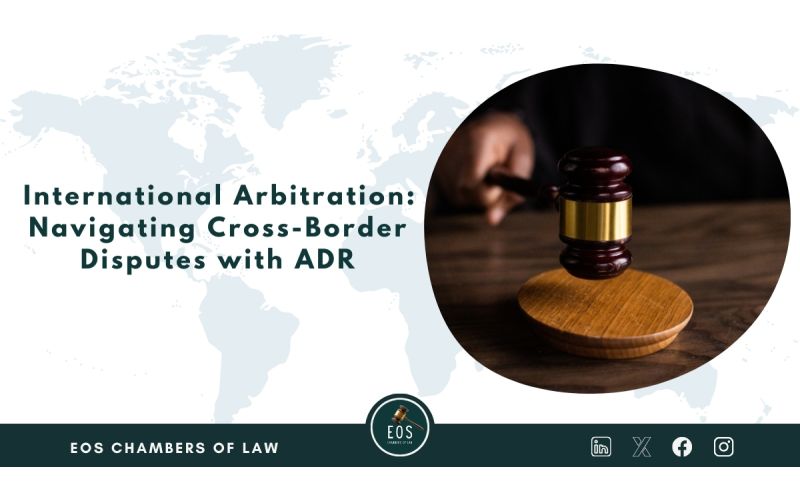International Arbitration: Navigating Cross-Border Disputes

International Arbitration: Navigating Cross-Border Disputes with ADR
As global business transactions increase, so do the risks of cross-border disputes. When parties from different countries find themselves in conflict, traditional litigation can be slow, costly, and fraught with jurisdictional complexities. This is where Alternative Dispute Resolution (ADR)—specifically, international arbitration—offers a more effective, neutral, and flexible path to resolution.
What is International Arbitration?
International arbitration is a process in which disputing parties agree to resolve their conflicts outside of traditional courts. Unlike litigation, which can be bound by national borders, arbitration operates under agreed-upon international rules, making it a powerful tool for resolving disputes between businesses or individuals from different jurisdictions.
Advantages of International Arbitration
-
Neutral Forum: One of the major benefits of arbitration is its neutrality. Parties can avoid the potential bias or inconvenience of having a dispute heard in the courts of one party's home country. Instead, arbitration offers a mutually agreed neutral venue, ensuring fairness.
-
Flexibility: Arbitration provides flexibility in terms of procedure and schedule. Parties can choose arbitrators with specific expertise, decide on the rules governing the arbitration, and set timelines that suit their needs—something traditional litigation often lacks.
-
Confidentiality: Unlike court proceedings, arbitration typically remains confidential. This is particularly beneficial for companies that wish to protect sensitive business information, maintain trade secrets, or avoid public scrutiny during a dispute.
-
Finality and Enforceability: Arbitration awards are final and binding. Thanks to the New York Convention, arbitral awards can be enforced in over 160 countries, giving parties confidence that their agreements will be honored across borders. This makes arbitration a more predictable and effective tool for resolving international disputes.
-
Cost and Time Efficiency: Arbitration is often faster and less expensive than litigation, which can drag on for years. The streamlined process of arbitration can significantly reduce costs, especially in complex, multi-jurisdictional disputes.
Key Considerations in International Arbitration
While arbitration is an excellent tool for resolving cross-border disputes, there are a few key considerations to keep in mind:
-
Choice of Arbitrators: Selecting the right arbitrator is crucial. Ideally, parties should choose arbitrators with expertise relevant to the dispute and knowledge of the laws governing the contracts.
-
Governing Law and Jurisdiction: It is vital to agree on the applicable laws and jurisdiction before arbitration proceedings begin. This ensures that all parties are clear on the framework under which the dispute will be resolved.
-
Costs: While arbitration is often more efficient, costs can vary depending on the complexity of the case, the number of arbitrators involved, and the location of the arbitration. Proper planning and budgeting are essential.
Looking to the Future
As the global economy continues to expand, international arbitration will play an increasingly important role in resolving disputes. Whether it's disagreements over contracts, investments, or partnerships, arbitration offers a flexible and effective solution for businesses operating across borders.
In a world where the pace of business is fast and international relations are complex, ADR—particularly arbitration—stands out as a tool for fostering cooperation, avoiding costly litigation, and ensuring that disputes are resolved in a fair, timely, and efficient manner.
Post Categories
Featured Posts
Latest Posts
Latest Posts

Legal Ethics Professionalism Building Trust in the Legal Industry...
Integrity Accountability Confidentiality These pillars define a true legal professional But in today rsquo s fast-paced legal landscape how do we maintain them Upholding Client Confidentiality A lawyer rsquo s duty is to protect sensitive information mdash breaching it damages...

Legal Challenges in Remote Work Solicitors' Guide...
Introduction As remote work continues to redefine the modern workplace it brings with it a host of legal considerations that businesses and employees must navigate From data protection to employment law and contractual obligations the shift to remote work presents...

Personal Law Or Statute Can't Override Welfare Of Child' Supreme Court Grants Custody Of...
The Supreme Court while granting custody of a minor child to the her aunt despite opposition from the father held that the personal law or statute couldn't override the welfare of the child while deciding the custody of the child...

No Law Gives Right To Husband To Beat Torture His Wife Delhi High Court...
Synopsis The court was hearing an appeal by a woman challenging the decision of the trial court nbsp whereby it has dismissed her petition seeking divorce from the man on the ground of cruelty and desertion While granting divorce to...

Government trying to draft laws in simple manner and in Indian languages Pm Modi...
Prime Minister Narendra Modi emphasized the importance of lawyers and the judiciary in shaping the country's legal system Prime Minister Narendra Modi expressed his gratitude to the legal fraternity for their substantial contribution to the country's independence movement and its...

International Arbitration Navigating Cross-Border Disputes with ADR...
As global business transactions increase so do the risks of cross-border disputes When parties from different countries find themselves in conflict traditional litigation can be slow costly and fraught with jurisdictional complexities This is where Alternative Dispute Resolution ADR mdash...

Speak With Our
Get a Appointment
















